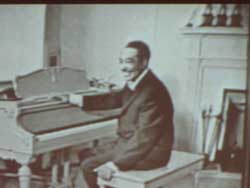By Joe Lambe
Duke Ellington was a jazz genius who lived an image and hid his private life so much his autobiography never even mentioned his marriage or any lover, his biographer said Wednesday.
Yet he carried a scar on his face from where his wife cut him with a razor after one of his affairs, and a friend said “he had the sexual appetite of a romping, stomping alley cat,” said Terry Teachout, the Wall Street Journal drama critic.
The man who wrote “Duke: A Life of Duke Ellington” spoke about his subject Wednesday at the downtown Kansas City library.
Ellington was the son of a butler and grandson of a slave who dressed like a fine gentleman and presented himself like royalty.
That worked with his genius to make him among the first black men to become truly famous and admired by whites, said Teachout, who used to be a critic for the Kansas City Star.
When touring with his band in the Jim Crow south, he hired private Pullman rail cars that could pull off on side tracks for the night to avoid the indignity of not being allowed into hotels and restaurants.
When people would go up and ask what it was about, Teachout said, “Ellington would say, this is the way the president travels.”
Among Teachout’s other comments:
Ellington saw himself as a symbol of black pride, of racial pride, and he never let his guard down – “He only showed you what he wanted you to see an nothing more.”
But he was a great man with great flaws, “a self-centered hedonist where everything was subject to his art and if possible to his pleasure.”
After he died, his son found a note with three sentences: “No problem. I’m easy to please. I just want to have everybody in the palm of my hand.”
He was often not easy to work for but he was so good that musicians who left him in anger would return and play for him most of their lives.
He wrote great music for their specific strengths and made them sound their absolute best.
“They were stuck with him and he with them.”
As for his music, “He was to jazz what Aaron Copland is to classical music – the great American composer.”





Trackbacks